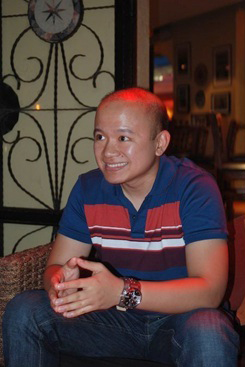“I am humbled and honoured to be given this award. Professor Ananda Rajah strikes me as a very charismatic educator, a very down to earth person, a person who is of great scholastic caliber but at the same time willing to engage his students. He is your quintessential teacher. To be put in the same vicinity is both a privilege and a challenge to be mindful of my place as a teacher whose primary role is to continually engage in the most genuine and transformative sense. I think Professor Ananda Rajah stood for all these things. Hence, I see this award as a commencement, a beginning, rather than a culmination. The process of learning and teaching never ceases.”
Enrique Niño P. Leviste is the recipient of this year’s Ananda Rajah Best Graduate Thesis Award. His PhD thesis submitted in 2011 is titled Catholic Church Hegemony amidst Contestation: Politics and Population Policy in the Philippines (supervised by Dr Daniel Goh). Enrique’s thesis asks questions about how the Philippine Catholic Church established and maintained a hegemonic sway within a post-authoritarian political context. He is also interested to know how the Church resuscitated and preserved its influence despite several political upheavals in the Philippines and how the perpetuation of Church hegemony affects policy processes. The thesis examines the underlying forces that account for the continuity of the Catholic Church’s hegemony especially within a democratic social milieu.
Enrique’s thesis was motivated by the Gramscian analysis of politics which looks at how a dominant group is able to perpetuate power politically and ideologically notwithstanding opposition. A major issue Enrique wanted to study was how the Catholic Church in the Philippines was able to nurture and build alliances within different segments of society as exemplified by its emboldened involvement in the reproductive health (RH) and family planning (FP) policy process. Through this study, Enrique seeks to help people understand that the political arena is a dynamic, contested and heterogeneous field. In his thesis, he also highlights the prevalence of resistance coming from an evolving counter-hegemonic movement. Enrique does not subscribe to any one-dimensional, top-down interpretation of everyday politics. Instead, he lends support to the Gramscian argument that the actions of dominant and subaltern sectors both shape the overall political landscape.
As an academic, Enrique’s areas of interest include Political Sociology and Critical theory. He is currently working at the National Institute of Education as a Research Associate and has developed a strong fondness for the works of Paulo Freire, John Dewey, and Maxine Greene, to name a notable few.
As a tutor at NUS, Enrique taught modules such as SC1101E (Making Sense of Society) and SC2204 (Social Inequalities: Who Gets Ahead?). His passion for teaching won him a FASS Graduate Student’s Teaching Award (GSTA) in 2010-2011. Prior to coming to Singapore, Enrique was a Sociology lecturer at the Ateneo de Manila University (Philippines) for 5 years. He sees teaching as a challenging and rewarding vocation; a very creative, dynamic, and transformative process. As a teacher, Enrique aims to cultivate an environment where students are encouraged and empowered to think critically and act persuasively on pertinent issues in society. Crucial to this is Enrique’s desire to help students realize that they are not empty receptacles to be filled with knowledge; rather, every student is an active participant that can substantially contribute to the shaping of knowledge.
written by Caryn Tan, 30 Aug 2012
